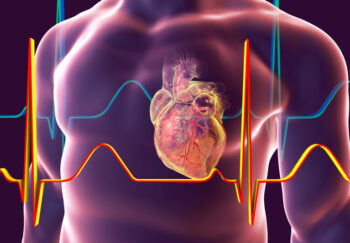What do you think of when you hear the words “heart disease”? I recall overweight men on TV clutching their chests. Or an older woman at a family reunion who can’t get excited because of her "heart condition." These steretoypical scenes may happen for some people with heart disease. But they're not true for everyone with it.
When we say "heart disease," it covers a lot of different heart diseases. Some share causes and treatments. Others are related – having one heart condition can lead to another over time. For instance, my father had a heart attack in his middle age. When he was older, he had another, and it lead to heart failure.
Treating the Types of Heart Disease at UVA Health
Your heart has one of the most important jobs in your body. Any damage to it is serious. If you have heart disease, you should know what kind you have.
If your doctor has told you have heart disease, you’re probably nervous about your future. You have lots of questions. The more you read, the more nervous you might get. But the heart disease experts at UVA Health, like Chad Hoyt, MD, can help. We can answer your questions. And we’ll guide you through lifestyle changes and treatment if you need it.
Who Gets Heart Diseases?
Heart diseases are some of the most common health conditions. All races, genders, and ethnicities are affected by it (but not all equally). In fact, the Centers for Disease Control and Prevention (CDC) says that someone in the U.S. dies from heart disease every 34 seconds.
You might be more likely to get a heart disease if you have:
- High blood pressure
- High levels of cholesterol (can cause atherosclerosis, a build-up of cholesterol in your blood vessels)
- Diabetes
- Obesity
On top of these risk factors, what you eat and do also makes a difference. If you use tobacco or overuse alcohol, you might get some types of heart disease.
Family history can also play a role. Some people are more likely to get heart disease because of their genes. Genes are like instructions that tell our bodies how to work. You get your genes from your parents.
If you have certain genes, you might be more likely to have problems with your heart. But just because you have those genes doesn't mean you'll definitely get heart disease.
"Many patients come in to see us because they're worried about a strong family history of heart disease," says Hoyt. "They wonder if they have the same disease as their family member and it just hasn’t been detected yet. We like to see these patients early." UVA Health heart experts can use imaging to find and measure plaque buildup in your body. This will help them understand your potential for a heart condition.
Not Everyone's Risk Is the Same
Not everyone has the same level of risk of getting heart disease. And not everyone is affected in the same way. For instance, women often have different symptoms than men when they have a heart attack. Your race or ethnicity also affects how likely you are to get or die from certain heart conditions.
"Many patients don't experience typical heart symptoms. This is especially true in our female population. If you have symptoms that are concerning to you, please do not hesitate to contact us so we can help," says Hoyt.
Learn more about the impact of research and heart health equity.
Social Issues Also Affect Risk
Your health also directly results from your social class and the environment you grew up in. These risk factors are called the social determinants of health. The World Health Organization notes that the "social determinants of health are mostly responsible for health inequities – the unfair and avoidable differences in health status seen within and between countries.”
The social determinants of health include:
- Where you were born, grew up, and live now
- Whether you were rich or poor growing up and now
- Education level and quality
- How easy it is for you to get quality healthcare
People who don't have a lot of money might not be able to buy healthy food, so they could get sick more easily. Not knowing how to read can hurt your ability to make good choices about your health. Some people might have trouble getting to see a doctor or getting the medicine they need. These issues might have an even bigger impact if you're from a group that has historically faced issues of racism or exclusion.
Types Of Heart Disease: What Are They?
The funny thing about heart diseases is that they share some common symptoms. That can make things confusing when you’re educating yourself. Most heart disease symptoms include:
- Chest pain, pressure, or tightness
- Trouble breathing
- Feeling like you’ll pass out
- Racing or pounding heartbeats
If you or someone you know is having these symptoms, you should call 911.
Despite these common symptoms, heart diseases don’t all affect you in the same way. Let’s look at the different types of heart disease and what to watch out for.
Trouble Breathing? Feeling Dizzy?
These can be signs of heart disease. If you're having symptoms, concerned about family history, or just have questions, a UVA Health heart expert can help.
Coronary Artery Disease (CAD)
What is it?: Coronary artery disease is the most common type of heart disease. It happens when blood vessels that send blood to your heart muscle (called arteries) become narrow or blocked. The blockage comes from a buildup of fat, cholesterol, and other stuff on your artery walls. That buildup is called plaque. It reduces blood flow to your heart muscle.
What happens?: CAD can cause the classic heart symptom of chest pain (called angina). Without treatment, it can cause a heart attack.
Heart Failure
What is it?: Heart failure is when your heart can’t pump enough blood to meet your body's needs. It often shows up with other types of heart disease.
What happens?: Heart failure shows up with the usual symptoms, plus swelling in the legs and feet and a fast heartbeat. Treatment for heart failure may include medications, lifestyle changes, and, in severe cases, surgery.
"At UVA Health, we have a highly advanced center for heart failure. If you've been diagnosed with this disease, our treatment strategies can range from simple medications and lifestyle changes to destination therapy, including high-tech pacemaker devices, defibrillators, or even ventricular assist devices. We even sometimes recommend and perform heart transplant," says Hoyt.
Heart Rhythm Disorders (Arrhythmias)
What is it?: Arrhythmia is a word used for any abnormal heart rhythm. There are many different types of arrhythmia, including atrial fibrillation, ventricular tachycardia, and supraventricular tachycardia. Arrhythmias can be caused by a variety of factors, including heart disease, medications, and electrolyte imbalances.
What happens?: Symptoms of arrhythmia can include palpitations, dizziness, and shortness of breath. Treatment can include medication, lifestyle changes, and procedures such as ablation.
Heart Valve Disease
What is it?: Heart valve disease occurs when one or more of the heart's valves don't function properly. There are four valves in the heart that control the flow of blood through the heart chambers.
What happens?: When one of these valves doesn't open or close properly, you'll feel chest pain on top of other heart disease symptoms. Treatment for valve disease may include medication or surgery to repair or replace the damaged valve.
Hoyt notes, "We have some exciting new technologies that allow us to repair or replace the valve" without major surgery. "This applies to common valve diseases, like aortic valve stenosis and mitral regurgitation."
Congenital Heart Disease (CHD)
What is it?: Congenital heart disease means that you were born with a heart condition. It might be a genetic condition that runs in your family. Or it happened when you were in your mother's womb. Congenital heart diseases range from mild to severe.
What happens?: CHD happens when there is a problem with the structure of the heart or the blood vessels near the heart.
"If surgery is needed, UVA Health has an excellent congenital heart surgery program. Our quality outcomes are great and recognized nationally," Hoyt says.
Cardiomyopathy
What is it?: Cardiomyopathy causes your heart muscle to change. That makes it harder for it to pump blood. The muscle might become thicker. Or it might become thinner and stiff.
There are several different types of cardiomyopathy
- Dilated
- Hypertrophic
- Restrictive
There are also other types that don’t fall into these categories.
What happens?: Look for swelling in the legs and feet.
Peripheral artery disease (PAD)
What is it?: Peripheral artery disease and other vascular diseases affect the blood vessels outside of the heart. It most often shows up in your legs. It happens when the blood vessels become narrow or blocked. That means less blood flow to the legs and feet.
What happens?: You'll experience leg pain, cramping, and weakness.
Questions? Your Doctor Can Help
Seeing a doctor about your health questions is the best first step to take. They can check your symptoms and test you if needed. Being aware and taking the right actions to manage and improve any heart condition can make all the difference.


